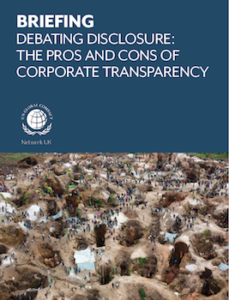
Today the Global Compact Network UK publishes their briefing ‘Debating Disclosure: the pros and cons of corporate transparency’.
Businesses are facing increasing demands from their stakeholders, especially consumers, investors, and regulators, to be more transparent about their business practices and their exposure to risks related to their environmental, social, and governance (ESG) performance.
Initiatives that rank companies’ performance based on information in the public domain, such as the Corporate Human Rights Benchmark, Oxfam’s Behind the Brands campaign, and the World Benchmarking Alliance, are creating new incentives for leading companies to be transparent about their ESG performance.
Pushing against the trend for more transparency are the costs of data collection, requirements for assurance, exposure to legal jeopardy, and legitimate perceptions of reputational risk.
The lines between mandatory and voluntary, compliance and non-compliance, financial and non-financial are all blurring.
These changes in the corporate reporting landscape and, more generally, in the context of sustainability information disclosure, are creating new conflicts within companies as different departments try to reconcile their sometimes very different views of the costs and benefits of transparency.
‘Debating Disclosure: the pros and cons of corporate transparency’ explores the tension within companies regarding their reporting and disclosure on environmental, social and governance (ESG) issues to build a better understanding of the risk/return profile of transparency and thereby help companies to balance competing interests.
Download the briefing here.



